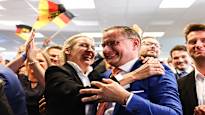In Germany and Austria, pro-Russian parties are increasing their support based on door-to-door polls.
The partly far-right and pro-Russian Alternative for Germany (AfD) party is becoming the second largest party in Germany in the European elections with a good 16 percent support, according to door-to-door polls in Germany according to public radio ARD.
The result is the party’s best ever, and the number of votes is more than five percentage points higher than in the last European elections. This is despite the fact that the party, which was mired in scandals throughout the spring, had to withdraw two of its leading candidates from the lists.
AfD leaves all parties in the current government behind.
Chancellor By Olaf Scholz the social democratic SPD party is only coming in third, with its lowest ever result, which is 14 percent.
However, the result is especially bitter for the government’s second party, the Greens. Its number of votes is collapsing by more than 8 percentage points from the last election and remains at just over 12 percent. In total, all three governing parties are getting just over 30 percent of the votes.
As expected, the CDU/CSU party of the Christian Democrats is emerging as the largest with around 30 percent support.
The pro-Russian left is also on the rise
In addition to the AfD, the election winner emerged Sahra Wagenknecht the left-wing populist BSW party, founded only this year, with nearly six percent support.
The result is tough in Germany, where new parties rarely manage to exceed the five percent vote threshold set for the Bundestag. The number of votes of Wagenknecht’s party also clearly covers the votes of his former leftist party Die Linke, which is falling below three percent.
Wagenknecht has harshly criticized the arms aid given to Ukraine and has constantly demanded the start of peace negotiations with Russia.
Wagenknecht’s party does not yet have a group in the European Parliament. Chairman of the Left Alliance Lee Andersson has said that he does not want to cooperate with Wagenknecht. Die Linke belongs to the same group as the Left Alliance.
Representatives of the AfD, on the other hand, have been suspected of spying for China and Russia. The party has also vehemently opposed Western arms aid to Ukraine.
In Austria, too, the pro-Russian far-right is taking the expected election victory. According to door-to-door polls, the radical right-wing party FPÖ is getting 27 percent of the vote, almost 10 percentage points more than in the last European elections.
Polling stations have closed in Germany and Austria.
